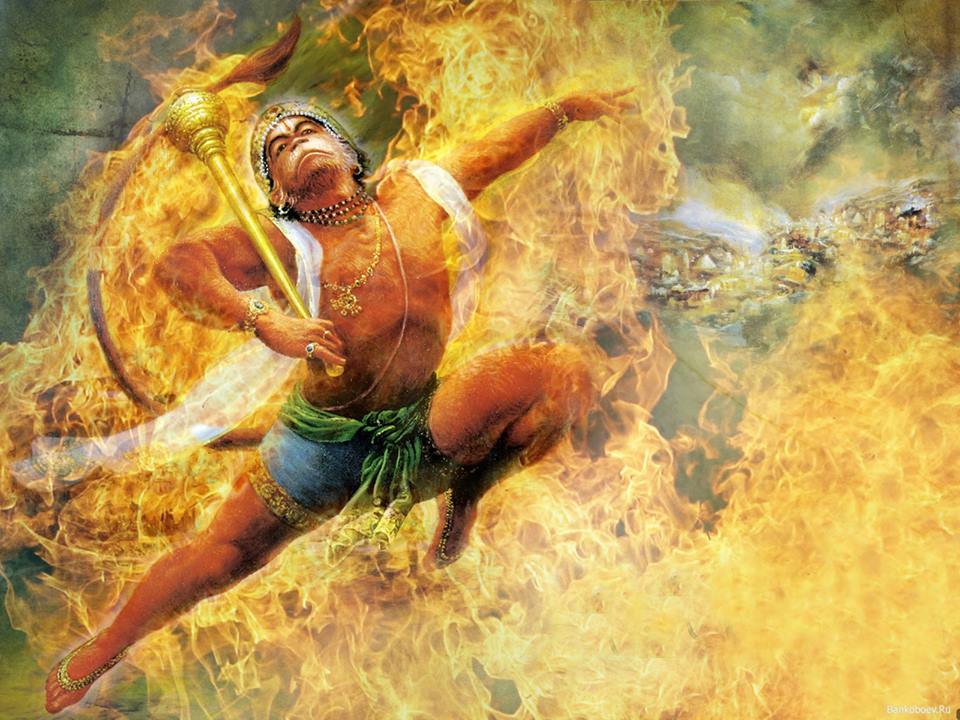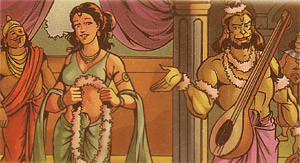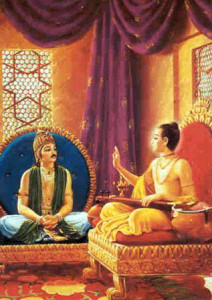Once Narada Muni met Hanuman and confronted him by saying, “You are not a devotee!” Narada said this in jest, as he was a pure devotee himself and wanted to reveal Hanuman’s true devotion.
Hanuman, surprised, asked how Narada came to that conclusion.
Narada Muni replied, “According to Vedic injunctions, there are six kinds of aggressors, and one of them is a person who sets fire to others’ houses. Such aggressors incur no sin when they are killed, as their actions are grave sins. When you went to find Mother Sita in Lanka, you set fire to the houses of the Rakshasas on your return. How then can I call you a devotee of the Lord?”
Understanding Narada’s intent, Hanuman smiled and said, “My dear Naradaji, an important duty of a Rama bhakta is to take charge of unclaimed dead bodies and perform their final rites so that they attain a better life in their next birth. When I went to Lanka, I found that in those big palaces, nobody was chanting the names of the Lord. The shastras state that those who do not chant the holy names and fame of the Lord are considered dead bodies. Since they were already dead, to release them from their most miserable existence, I burned all of them along with their palaces. The only palace I left unburnt was that of Vibheeshana, from where I heard the names of Lord Rama being chanted.”
Hanuman continued, “In fact, I went one step further and made a loud roar, which frightened all the resident rakshasas of Lanka. Hearing that fierce roar, many pregnant rakshasis’ wombs were aborted. This way, I ensured that the rakshasa clan would not appear in Lanka in the future and create disturbances.”
Narada Muni was pleased to hear Hanuman’s answer. He hugged and praised Hanuman for his unsurpassable devotion to Lord Rama.
Moral of the story: This beautiful conversation between Narada Muni and Hanuman reveals that without chanting the names of the Lord, we are all living dead.
In Srimad Bhagavatam verse 10.38.12, Akrura, while traveling from Mathura to Vrindavan to bring Lord Krishna and Lord Balaram to Mathura at Kamsa’s behest, reveals five unique transcendental qualities of words describing the Lord’s glories and the result of those who lack them:
yasyaakhilaameeva habhih sumangalaih vaaco vimishraa guna-karma-janmabhih praananti shumbanti punanti vai jagad yaas tad-viraktaah shava-shobhanaa mataah
“All sins are destroyed and all good fortune is created by the Supreme Lord’s qualities, activities, and appearances, and words that describe these three things animate, beautify, and purify the world. On the other hand, words bereft of His glories are like decorations on a corpse.”
The unique positive results when we chant the holy name, fame, qualities, activities, and appearance of the Lord are:
- Akhila ameeva habhih – It destroys all the sins of the entire world. Other processes may destroy some sins, but chanting the Lord’s glories is the only process that can destroy all sins.
- Sumangalaih – It creates auspiciousness and good fortune all over the world.
- Praananti – It animates and brings life to otherwise dead beings.
- Shumbanti – It beautifies the entire world. (Our spiritual master would say that without performing devotional service, our faces look like rotten bananas. If we perform devotional service, our faces will become bubbly like watermelons.)
- Punanti – It purifies the entire world. (Even Narada Muni says the same thing to Vyasadeva—jagat pavitram, it sanctifies the entire universe).
In contrast, words that do not chant the Lord’s glories are considered shava shobhanaa mataah—decorations on a dead body. Those attracted to words devoid of the Lord’s glories are as good as dead bodies.



